In this article:
Vitamin K is an essential fat-soluble vitamin that plays an important role in both bone and heart health.
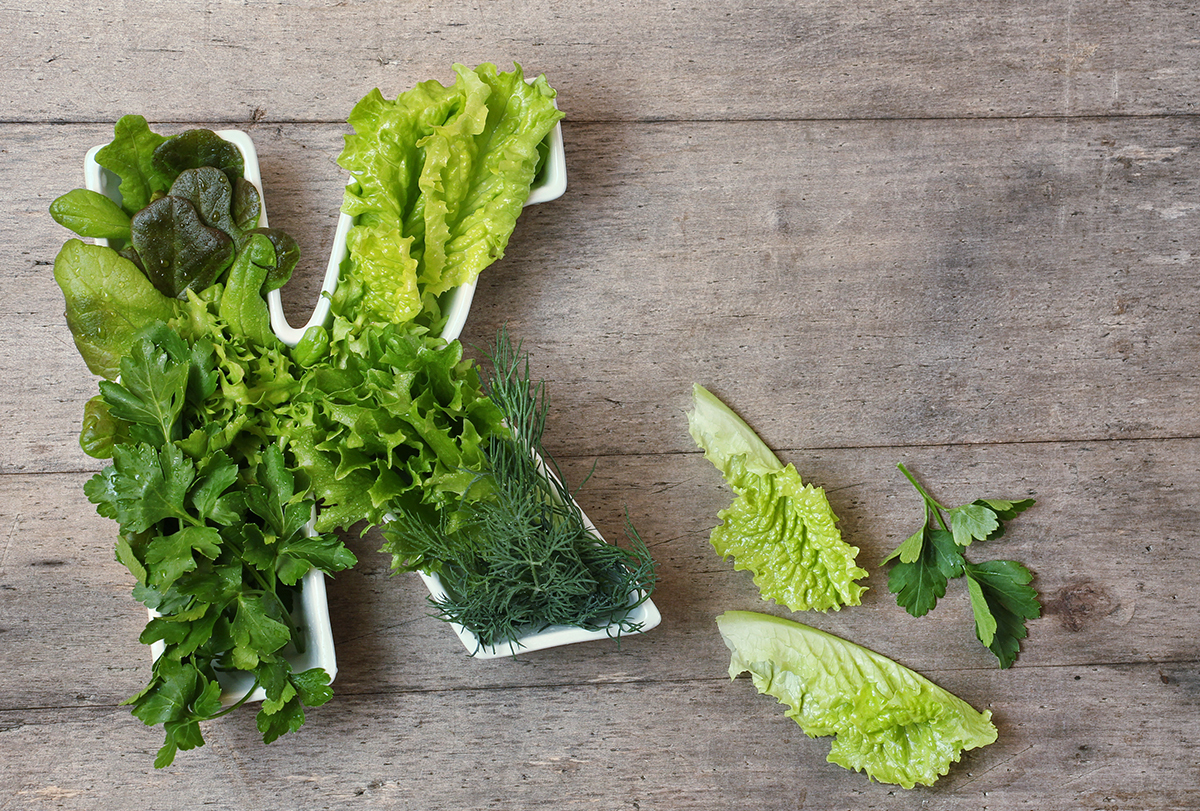
Vitamin K is a family of bioactive compounds that have a common chemical structure of 2-methyl-1, 4-naphthoquinone. These compounds include phylloquinone (vitamin K1) and a series of menaquinones (vitamin K2). (1)
Being fat-soluble, vitamin K is stored in fat tissues and the liver.
Signs and Symptoms of Vitamin K Deficiency
Vitamin K deficiency can result in defective blood clotting, increased bleeding, and osteoporosis.
Signs and symptoms of vitamin K deficiency include easy bruising, blood oozing from the nose or gums, heavy menstrual periods, gastrointestinal bleeding, blood in the urine and excessive bleeding from wounds, punctures, injection sites, or surgical incisions.
People with chronic malnutrition, alcohol dependency, or health conditions that inhibit the absorption of vitamins are at a higher risk of suffering from vitamin K deficiency.
How Much Vitamin K Do You Need
Recommended dietary allowances (RDA) for Vitamin K
| Age | Male | Female |
|---|---|---|
| 0–6 months | 2.0 mcg | 2.0 mcg |
| 7–12 months | 2.5 mcg | 2.5 mcg |
| 1–3 years | 30 mcg | 30 mcg |
| 4–8 years | 55 mcg | 55 mcg |
| 9–13 years | 60 mcg | 60 mcg |
| 14–18 years | 75 mcg | 75 mcg |
| 19+ years | 120 mcg | 90 mcg |
Based on age and gender, the U.S. National Institutes of Health recommends a daily intake of vitamin K in micrograms (mcg) as per the table above. This may vary depending on certain illnesses or medical conditions. You need to consult a doctor with any questions you may have regarding this.
Natural Sources of Vitamin K
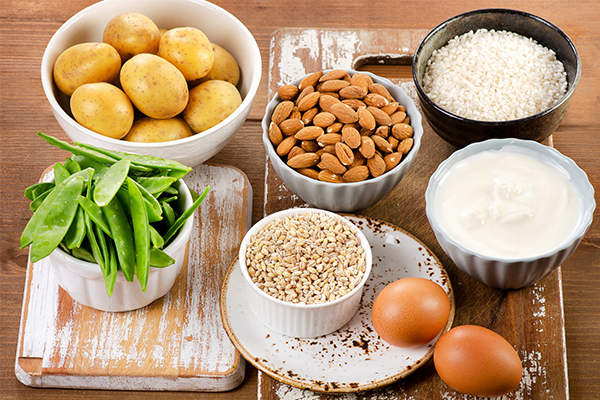
To get vitamin K, you can always take supplements after consulting your doctor. However, there are many natural sources, too.
Leafy greens and cruciferous vegetables are two of the best sources of vitamin K. Some examples include kale, collard greens, spinach, iceberg lettuce, turnip greens, Swiss chard, Brussels sprouts, cabbage, parsley, broccoli, and asparagus.
Other food sources include natto (fermented soy), spring onions, prunes, cucumbers, dried basil, liver, chicken, green tea, sea vegetables, fish, eggs, soyabean oil, canola oil, and fermented dairy products like yogurt and cheese.
Phylloquinone (vitamin K1) is mainly present in leafy greens, vegetable oils, and vegetable margarine whereas menaquinone (vitamin K2) is mainly present in liver, chicken, egg yolk, natto, and certain cheeses. (2)
Advantages of Vitamin K to Your Health
Here are some benefits of vitamin K for your health.
1. Regulates blood clotting
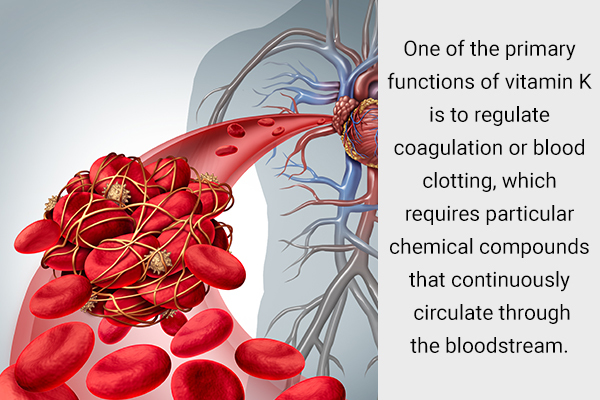
One of the primary functions of vitamin K is to regulate coagulation or blood clotting, which requires particular chemical compounds that continuously circulate through the bloodstream.
It plays a key role in the conversion of a blood plasma protein called prothrombin into thrombin by an enzyme known as prothrombinase or Factor X. Thrombin then transforms fibrinogen into fibrin which combines with platelets to form clots. This all happens automatically when an injury occurs that affects blood vessels.
Also, vitamin K is an essential cofactor in biochemical processes that help transport calcium throughout the body, support bone formation, regulate blood clotting and play a role in preventing the hardening of blood vessels. (3)
This vitamin also helps improve blood disorders called myelodysplastic syndromes. (4) It is used to reverse the effects of blood-thinning medications when they are administered or taken in excess. (5) Furthermore, it prevents clotting problems in newborns who have low vitamin K levels.
2. Improves bone health
Vitamin K plays a crucial role in improving bone health and reducing the risk of bone fractures. It is especially important for postmenopausal women who are at risk for developing osteoporosis.
Your body needs vitamin K to utilize calcium and build healthy bones. An adequate amount of vitamin K, especially K2, is needed to activate osteocalcin, a protein circulating in the blood that binds calcium ions to the bone (tissue) matrix, which helps make bones stronger. (6)
In addition to its role in the enzymatic modification of osteocalcin (a protein involved in bone mineralization), vitamin K also positively affects the balance of calcium, a key mineral in bone building and maintenance, according to a 2001 study published in Nutrition. (7)
In a 2016 review that appeared in the peer reviewed journal Critical Reviews in Food and Nutrition, the authors analyzed data from 99 papers published between 2005 and 2015. They found convincing evidence that vitamin K2 promotes bone formation and prevents its breakdown, at the same time reducing arterial calcium deposits. (3)
When all the extant evidence is taken into consideration, it becomes clear that people with adequate amounts of vitamin K have greater bone density, while low levels of vitamin K are linked to osteoporosis.
3. Supports heart health
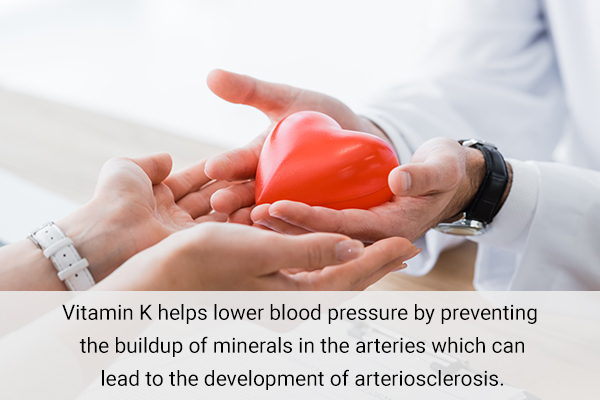
Vitamin K is also good for heart health.
First of all, vitamin K helps lower blood pressure by preventing the buildup of minerals in the arteries (mineralization) which can lead to the development of arteriosclerosis (more commonly referred to as “hardening of the arteries”). This allows the heart to freely pump blood throughout the body.
A 2009 study published in Atherosclerosis reports that a high dietary menaquinone (vitamin K2) intake is associated with reduced coronary calcification. This suggests that adequate menaquinone intake plays a role in preventing cardiovascular disease. (8)
In 2015, a paper appeared in the journal Thrombosis and Haemostasis in which the results of a three-year double blind, placebo-controlled study that gaged the long-term effects of MK-7 (menaquinone-7,180 mcg daily) on arterial stiffness in healthy postmenopausal women were discussed.
A total of 244 women participated with half getting MK-7 and the other half a placebo (neither the study participants nor the researchers knew which women got the MK-7 and which ones got the placebo, which is what is meant by the term “double blind”).
The researchers found that the women who received MK-7 showed decreased arterial stiffness, especially women who went into the study with high arterial stiffness. (9)
Second, this vitamin aids in reducing inflammation and protecting cells that line the blood vessels, including both veins and arteries. This in turn decreases the likelihood of an individual developing atherosclerosis or blockage of major arteries (which can raise blood pressure and culminate in a heart attack or stroke).
4. Enhances insulin sensitivity
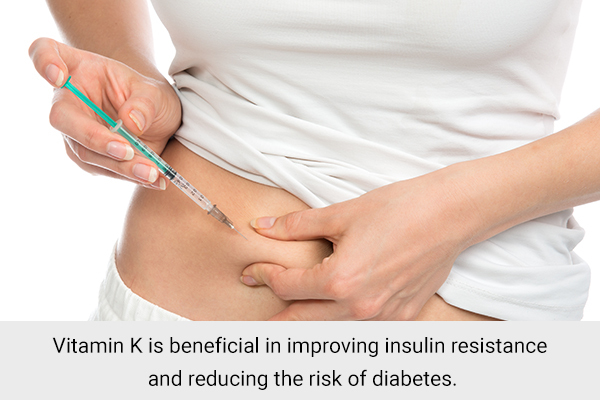
Vitamin K is also beneficial in improving insulin resistance and reducing the risk of diabetes. There are two types of vitamin K – K1 (phylloquinone) and K2 (menaquinone).
A 2008 study published in the journal Diabetes Care reports that vitamin K supplementation for 36 months reduced the progression of insulin resistance in older men. (10)
In another 2010 study published in the same journal, researchers examined the dietary habits of 38,000 Dutch adults for a decade and found that those who consumed the most vitamin K were 20% less likely to develop type 2 diabetes. (11)
These findings were supported by the findings of a double-blind randomized controlled clinical trial on the effects of vitamin K1 on insulin sensitivity and insulin resistance in premenopausal, prediabetic women. Published in the European Journal of Clinical Nutrition in 2015, a study included 39 women taking 1,000 mcg of K1 daily for four weeks, while 43 women received a placebo.
At the conclusion of the clinical study, the researchers found that vitamin K1 did not affect insulin resistance but did have beneficial effects on glycemic status (i.e., blood glucose level) and insulin sensitivity. (12)
5. Reduces menstrual pain and heavy bleeding
Vitamin K is an important factor in the coagulation of blood, and without it, your blood will not clot properly. (13) For women, this can lead to extremely heavy bleeding during menstruation, which may also cause more pain and cramping.
Vitamin K also reduces premenstrual syndrome (PMS) cramps and other menstrual pains by regulating the function of a woman’s hormones.
6. Supports brain function
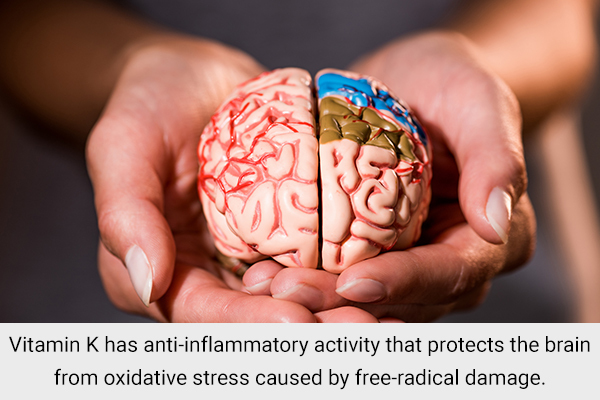
There is also growing evidence that vitamin K supports brain health.
This vitamin has anti-inflammatory activity that protects the brain from oxidative stress caused by free-radical damage. Oxidative stress can damage the cells of the brain and is implicated in Alzheimer’s disease, Parkinson’s disease, and others.
Vitamin K is also needed in sphingolipid metabolism. Sphingolipids are a class of naturally occurring molecules present in the myelin sheath surrounding the nerves and in brain cell membranes. These molecules are involved in a wide range of cellular activities that help in building and supporting the brain. (14)
A 2013 study published in the journal Neurobiology of Aging found that healthy men and women above 70 years of age with the highest average blood levels of vitamin K1 had higher verbal episodic memory performance when compared with people with lower blood levels of vitamin K1. (15)
Another 2013 study published in Seminars in Thrombosis and Haemostasis reviewed several studies on vitamin K and brain function. The study pointed to a positive role of vitamin K in cognition. (14)
In 2016, the journal Maturitas published a paper concerning an observational cohort (epidemiological) study in which 160 adults aged 65 and older, none of whom were taking any drug that interferes with or counteracts the effects of vitamin K, had their daily dietary vitamin K intake assessed using a 50-item food frequency questionnaire. (16)
The participants also had their subjective memory complaints assessed using the Memory Complaint Questionnaire. When the three-month study was completed and the results were tabulated and analyzed, researchers concluded that there was a “direct association between increased vitamin K intake and less severe subjective memory complaint among older adults taking no VKA” (Vitamin K antagonists). (16)
7. Can help fight cancer
Vitamin K is effective in the fight against colon, stomach, liver, oral, prostate and nasal cancers, due to its anticancer effects.
A 2003 study published in the Alternative Medicine Review reports 30 patients with a specific type of liver cancer who took oral vitamin K1. It was found that the disease stabilized in six patients, seven patients had a partial response and seven others had improved liver function. (17)
A 2013 study published in Evidence-Based Complementary and Alternative Medicine found that vitamin K2, a naturally occurring menaquinone or form of vitamin K, exerts therapeutic effects on both hormone-dependent and hormone-independent prostate cancer cells. (18)
If you have cancer or a family history of it, you should work with your physician to ensure that you get adequate vitamin K through dietary and/or supplemental means.
Additional Tips
- People taking prescription anticoagulants should never take supplemental vitamin K.
- Vitamin K supplementation during pregnancy (beyond the normal dietary intake) may increase the risk of jaundice in newborns.
- The intake of vitamin K-rich foods by breastfeeding mothers is generally considered safe.
- People taking high doses of aspirin and quinine may need to increase their vitamin K intake. Consult your doctor.
Expert Answers (Q&A)
Answered by Ms. Amy Gorin (Registered Dietitian and Nutritionist)
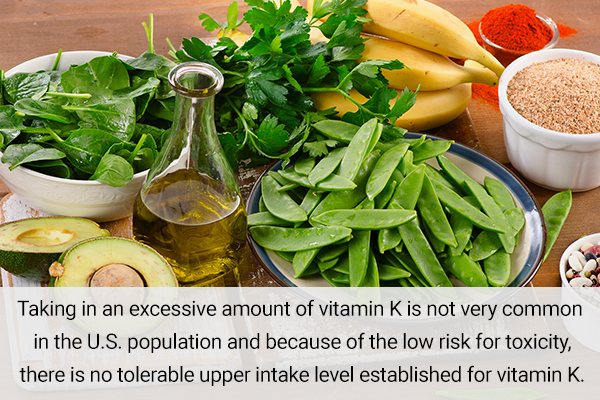
Taking in an excessive amount of vitamin K is not very common in the U.S. population and because of the low risk for toxicity, there is no tolerable upper intake level established for this vitamin.
Kiwi is an excellent source of vitamin K. One kiwi fruit contains 28 mcg vitamin K. This is more than 20 percent of the daily value, making it an excellent source. I like to add kiwi to a fruit pizza, as well as to a sangria mocktail.
This really depends on what foods you consume as part of your daily diet. Both vegetarians and non-vegetarians can regularly eat foods such as collards, turnip greens, spinach, kale, broccoli, soy, prunes, and pumpkin – which are all excellent sources of vitamin K.
You can enjoy these foods in many dishes – for instance, spinach in a lupini bean salad and prunes in homemade prune jam. Good sources of vitamin K include blueberries, chicken breast, grapes, cashews, and olive oil. I like to add blueberries to a blueberry peanut butter smoothie and grapes to a Greek yogurt parfait.
No. One medium banana contains 0.6 mcg vitamin K. This does not make it a significant source. Bananas offer plenty of other important nutrients, though, including blood-pressure-helping potassium and cholesterol-helping fiber. I like to add bananas to a healthy coffee smoothie and mango overnight oats.
Final Word
Because vitamin K is a fat-soluble vitamin, your body will best absorb it when you pair a food containing vitamin K with a food that contains fat. Choose a healthy fat if you can, such as avocado, olives, olive oil, nuts, or nut butter.
Certain antibiotics may interfere with vitamin K levels. This is typically only a concern if you have been on antibiotics for a long time, more than several weeks. If you are taking warfarin or certain other anticoagulants, you will need to monitor your vitamin K intake very closely.
Sudden changes in your vitamin K status can dangerously change the effect of the anti-coagulant.
- Was this article helpful?
- YES, THANKS!NOT REALLY


